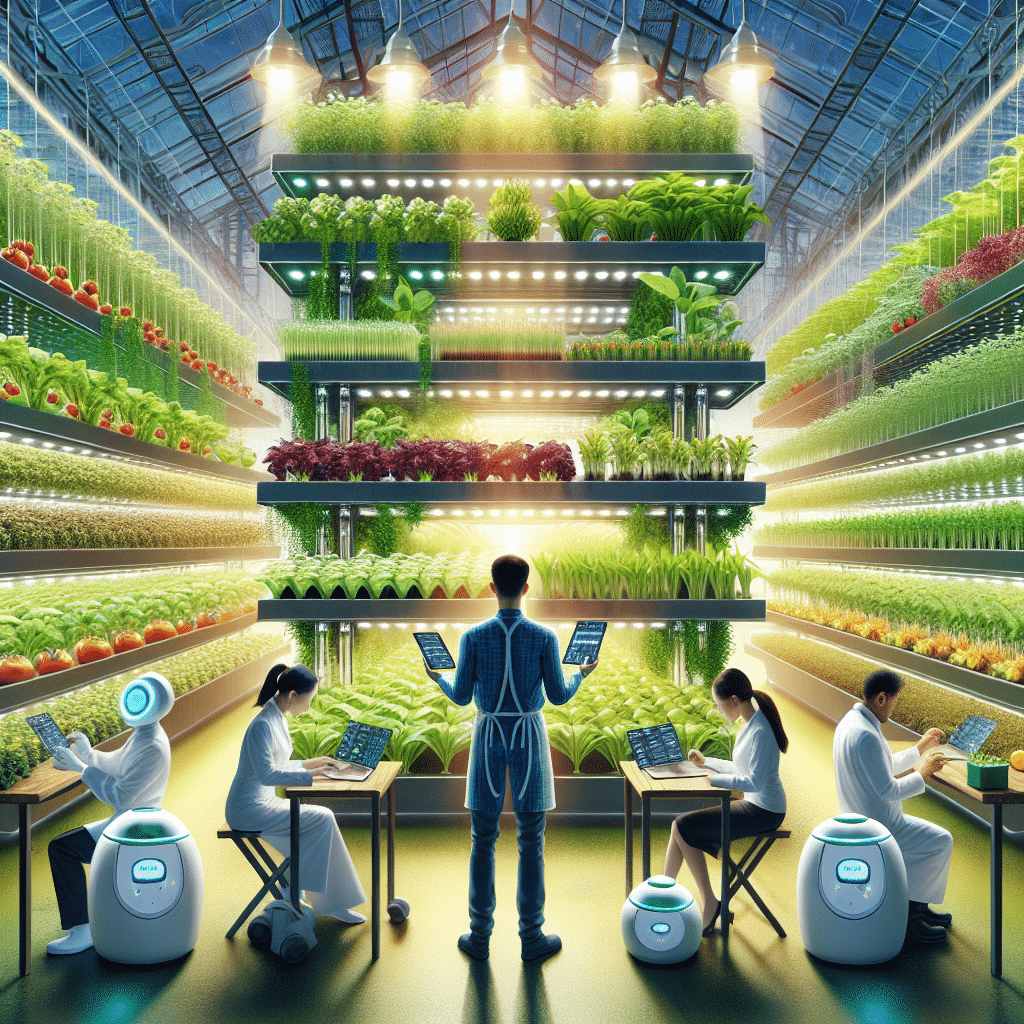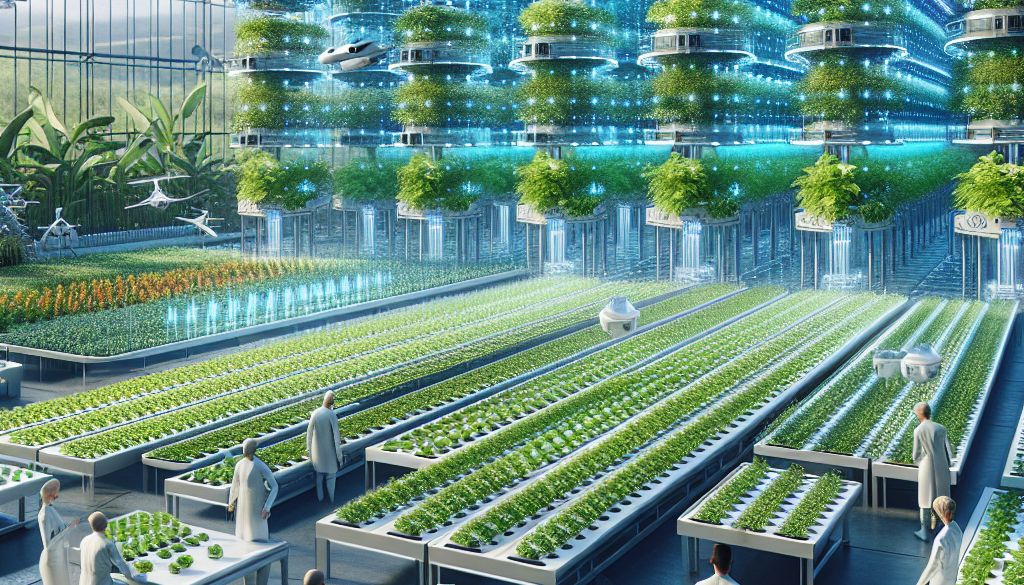Indoor Farming: The Future of Urban Agriculture
-
Table of Contents
- Indoor Farming: Revolutionizing Urban Agriculture
- The Rise of Indoor Farming
- Technological Innovations in Indoor Farming
- Case Studies: Success Stories in Indoor Farming
- Challenges and Limitations
- Statistics and Market Growth
- Conclusion: The Sustainable Future of Urban Agriculture
- ETprotein: Enhancing Nutrition with High-Quality Protein Products
Indoor Farming: Revolutionizing Urban Agriculture

As urban populations continue to grow, the demand for fresh, local produce is at an all-time high. Traditional farming practices are struggling to keep up with this demand, especially within the constraints of limited urban space and the need for sustainable, environmentally friendly solutions. This is where indoor farming comes into play, offering a promising future for urban agriculture.
The Rise of Indoor Farming
Indoor farming, also known as vertical farming or controlled environment agriculture (CEA), is the practice of growing crops in stacked layers, often without soil, and using artificial lighting. This innovative approach to agriculture has several advantages over traditional farming, particularly when it comes to urban settings.
- Space Efficiency: By growing crops in vertical layers, indoor farms can produce more food per square foot than traditional farms.
- Year-Round Production: Indoor farms are not subject to the same seasonal constraints as outdoor farms, allowing for year-round crop production.
- Resource Conservation: Indoor farming typically uses less water and can recycle nutrients more effectively than traditional farming.
- Reduced Transportation: By situating farms closer to urban consumers, indoor farming can significantly reduce the carbon footprint associated with food transportation.
Technological Innovations in Indoor Farming
Indoor farming relies heavily on technological advancements to optimize growing conditions and maximize yields. Some of the key technologies include:
- Hydroponics: A method of growing plants without soil, using mineral nutrient solutions in a water solvent.
- Aeroponics: A process where plants are grown in an air or mist environment without the use of soil or an aggregate medium.
- LED Lighting: Energy-efficient lights that can be tailored to provide specific light spectra for different stages of plant growth.
- Climate Control Systems: These systems manage temperature, humidity, and CO2 levels to create the ideal environment for plant growth.
Case Studies: Success Stories in Indoor Farming
Several companies and projects around the world have successfully implemented indoor farming techniques, showcasing the potential of this agricultural method. For instance:
- AeroFarms, based in Newark, New Jersey, operates one of the largest vertical farms in the world, producing greens using aeroponic technology.
- Plenty, a San Francisco-based company, has attracted significant investment for its high-tech indoor farms that deliver produce to local supermarkets with minimal transportation.
- Singapore’s Sky Greens operates the world’s first low carbon, hydraulic-driven vertical farm, producing a variety of Asian greens.
Challenges and Limitations
Despite its many benefits, indoor farming is not without its challenges. High initial setup costs, energy consumption, and the need for skilled labor are some of the hurdles that need to be addressed. Additionally, the range of crops that can be grown effectively indoors is currently limited, with leafy greens and herbs being the most common.
Statistics and Market Growth
The indoor farming industry is experiencing rapid growth. According to a report by MarketsandMarkets, the vertical farming market is projected to reach USD 9.7 billion by 2026, growing at a CAGR of 20.2% from 2021 to 2026. This growth is driven by increasing demand for fresh produce, advancements in farming technology, and the need for sustainable food production methods.
Conclusion: The Sustainable Future of Urban Agriculture
Indoor farming presents a sustainable and efficient solution to the challenges of urban agriculture. With its ability to produce fresh, local produce year-round, conserve resources, and reduce transportation emissions, it is poised to play a significant role in feeding the growing urban populations. As technology continues to advance and costs decrease, indoor farming could become an even more integral part of urban food systems.
ETprotein: Enhancing Nutrition with High-Quality Protein Products
As urban agriculture evolves, so does the need for nutritious and sustainable food sources. ETprotein is at the forefront of this movement, offering a range of high-quality protein products that are perfect for the health-conscious urban dweller. Their organic, non-GMO, allergen-free proteins are ideal for a variety of applications, from sports nutrition to health and wellness products.
ETprotein’s commitment to quality and sustainability makes their products a natural fit for those looking to incorporate more plant-based proteins into their diets. Whether you’re a food manufacturer, distributor, or consumer, ETprotein’s offerings can help you meet your nutritional goals while supporting sustainable agriculture practices.
About ETprotein:
ETprotein, a reputable protein and L-(+)-Ergothioneine (EGT) Chinese factory manufacturer and supplier, is renowned for producing, stocking, exporting, and delivering the highest quality organic bulk vegan proteins and L-(+)-Ergothioneine. They include Organic rice protein, clear rice protein, pea protein, clear pea protein, watermelon seed protein, pumpkin seed protein, sunflower seed protein, mung bean protein, peanut protein, and L-(+)-Ergothioneine EGT Pharmaceutical grade, L-(+)-Ergothioneine EGT food grade, L-(+)-Ergothioneine EGT cosmetic grade, L-(+)-Ergothioneine EGT reference grade and L-(+)-Ergothioneine EGT standard. Their offerings, characterized by a neutral taste, non-GMO, allergen-free attributes, with L-(+)-Ergothioneine purity over 98%, 99%, cater to a diverse range of industries. They serve nutraceutical, pharmaceutical, cosmeceutical, veterinary, as well as food and beverage finished product distributors, traders, and manufacturers across Europe, USA, Canada, Australia, Thailand, Japan, Korea, Brazil, and Chile, among others.
ETprotein specialization includes exporting and delivering tailor-made protein powder and finished nutritional supplements. Their extensive product range covers sectors like Food and Beverage, Sports Nutrition, Weight Management, Dietary Supplements, Health and Wellness Products, and Infant Formula, ensuring comprehensive solutions to meet all your protein needs.
As a trusted company by leading global food and beverage brands and Fortune 500 companies, ETprotein reinforces China’s reputation in the global arena. For more information or to sample their products, please contact them and email sales(at)ETprotein.com today.














